L Division Reconciliation Strategy 2021-2025
Background
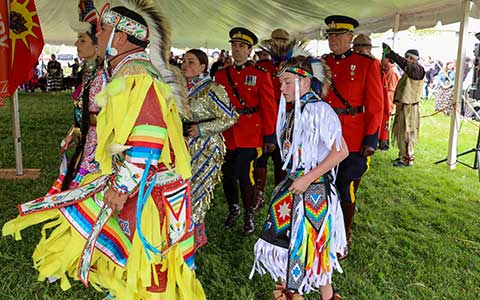
First Nations peoples in ceremonial dress dance in the opening parade of the Abegweit First Nations Pow Wow. PEI RCMP also walk with them.
L Division RCMP values its relationship with the Indigenous people of Prince Edward Island. Over the past number of years, various activities have been identified to foster engagement, trust, and build relationships between Indigenous peoples and police within the province. These activities not only enable law enforcement to better understand the meaning and importance of Reconciliation to Indigenous peoples, but enhance existing relationships, contributing to increased confidence in the partnership between the two.
It is essential to take into account an Indigenous worldview when working with or providing services to Indigenous people.
Indigenous people of Prince Edward Island
Prince Edward Island is home to 2735 Indigenous people, comprising 1.9% of the island's population. This population includes First Nations, Inuit and Metis. The island is also home to two Mi'kmaq First Nations communities – Abegweit and Lennox Island.
Of the current L Division RCMP employees, 1.2% self-identify as Indigenous.
Vision
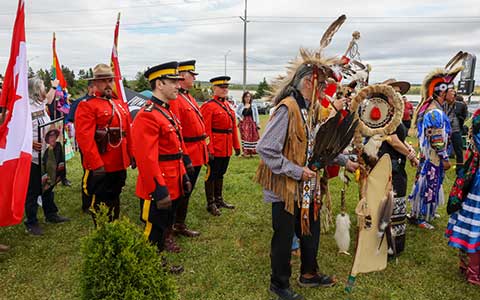
RCMP Members in red serge with Abegweit First Nations peoples in traditional dress await the opening parade of the Abegweit Pow Wow.
RCMP on Prince Edward Island continues to create a healthy environment with Indigenous communities to build relationships which will deliver culturally empathetic and competent police services. This is a shared goal, a holistic approach to strengthen our communities and provide a platform for deeper understanding, true healing and a strengthened foundation from which we move, together, toward a positive future.
Engagement
L Division RCMP has and continues to foster relationships with Indigenous persons on P.E.I.; including community and elected persons from Abegweit and Lennox Island First Nations Communities, and a variety of Indigenous Organizations. Focusing on increasing knowledge and understanding, exploring together meaningful actions on the path to true Reconciliation.
Engagement efforts include:
- Open dialogue with Commanding Officers Indigenous Advisory Committee;
- Communications with both Abegweit and Lennox Island First Nation Chief's and representatives;
- Continued collaboration with First Nations communities to identify appropriate policing resources for their respective communities to ensure positive relationships are identified;
- Regular meetings and discussions with the Mi'kmaq Confederacy of P.E.I. (MCPEI), and other organizations Native Council of P.E.I. (NCPEI), Aboriginal Women's Association of P.E.I.;
- Collaboration and senior leadership support and attendance for events, which foster understanding and recognition of shared history.
Working together
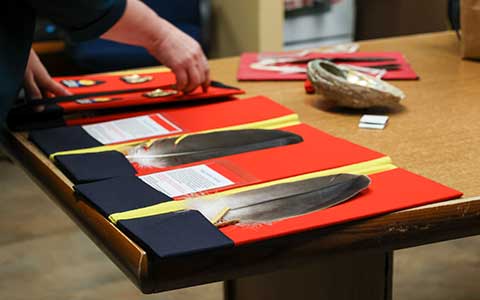
Ceremonial eagle feathers sit in decorative folders adorned with the RCMP colours. These feathers are used in courts so that First Nations peoples can swear an oath before testifying.
Building a strategy with Indigenous partners means we must acknowledge and honour the errors of the past, in order to not repeat them. We must now look forward to create a new path where mutual respect and trust is the foundation of this relationship.
Reconciliation on P.E.I.
Reconciliation is a relationship that requires a commitment between two groups. Like any good relationship that is to last it requires understanding action and moving forward together. This can only be achieved when we make people the priority, respecting and valuing different perspectives. Reconciliation requires building a strong and sustainable relationship, so that continued engagement can take place to ensure the work and values of both groups harmonize as we move toward achieving shared goals.
Reconciliation objectives
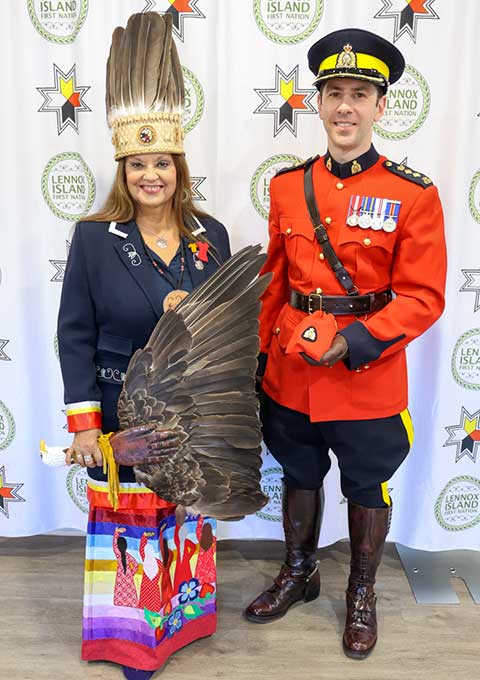
Lennox Island First Nation's Chief Darlene Bernard in ceremonial dress stands beside PEI RCMP Commanding Officer Chief Superintendent Kevin Lewis.
The L Division Reconciliation Strategy is focused on strengthening existing relationships and building new relationships with Indigenous people and communities in Prince Edward Island. Through engagement with Indigenous leaders and representatives, the RCMP will continue to identify initiatives that help build trust, understanding and respect between the RCMP and the Indigenous communities that we police.
- Ensure open dialogue with Indigenous Communities in order to provide a more community-focused service during our Reconciliation journey.
- Enhance awareness and education efforts of RCMP employees to better understand and demonstrate cultural competency when working with Indigenous Communities.
- Increase efforts to focus on Indigenous Community Engagement through programming and interaction.
- Ensure efforts are aimed at the Truth and Reconciliation Commission of Canada's Call to Action and Missing and Murdered Indigenous Women and Girls (MMIWG) Call for Justice.
Outcomes and impact
L Division RCMP remains committed to enriching relationships between Indigenous peoples and our employees, and delivering culturally sensitive policing services within the Province of Prince Edward Island. Through the acknowledgment and understanding of history, and recognizing that reconciliation is a long-standing pledge, opportunities have been identified to ensure the objectives and initiatives aimed at reconciliation are timely and attained respectfully.
Measuring results
How will L Division measure/define success within the context of our objectives in this strategy? L Division will ensure the following methods are implemented:
- Increased engagement with Indigenous partners;
- Increased delivery of culturally relevant education, awareness and training in support of Indigenous Communities and youth;
- Enhancing communication with First Nation Chiefs, representatives and Indigenous community groups;
- Documenting all initiatives to enhance reconciliation in the L Division Commanding Officers Annual Performance Plan.
L Division's Reconciliation Strategy will continue to evolve as we strengthen our relationship with Indigenous people and communities of Prince Edward Island. We are open and committed to exploring new ways to align our values and achieve our shared goals as we work together towards Reconciliation.
From the artist
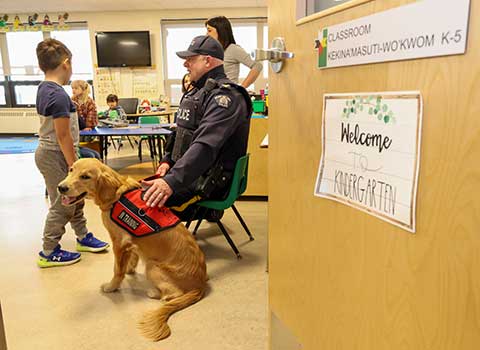
PEI RCMP Facility Dog "Lola" sits with Corporal Ian Allen inside a classroom at Lennox Island First Nations school showing Lola to the young students.
What is Reconciliation?
Reconciliation is the process of developing a relationship between the indigenous and non-indigenous people across Canada It's about working together to overcome the devastating effects of colonization.
It's important to acknowledge the harmful policies and practices such as residential schools, loss of land, inequitable access to essential services, and prohibition of cultural traditions and languages.
This Quill art piece is one of my favourites. The orange shirt in this represents the children of the residential school and the loss that they endured. The story behind it is that there was a child who had an orange shirt on when they were taken to the school and was told they would get it back and never did.
The red dress represents the Missing and Murdered Women and girls across Canada. In some tribes it is said that red is the only colour that spirits can see, it is hoped that by wearing red we can call back the missing spirits of our women and girls and lay them to rest.
The Medicine Wheel and the four colours to me represents harmony and unity between the four races. The mental, physical, emotional and spiritual health of one's well-being, the four elements fire, water, air, and earth, the four directions, and the four seasons.
And last but not least my favourite, the eight-pointed star. The eight-pointed star has been a symbol of the Mi'kmaq people for centuries. The eight points represent the eight districts of the Mi'kmaq people.
Since I started doing Quill Art I have been drawn to the Eight Pointed Star and it has been in a lot of my quill art pieces.
Kay Sark's artwork will be displayed in the Lennox Island First Nation Community Office.
Important reflections during Mi'kmaq history month
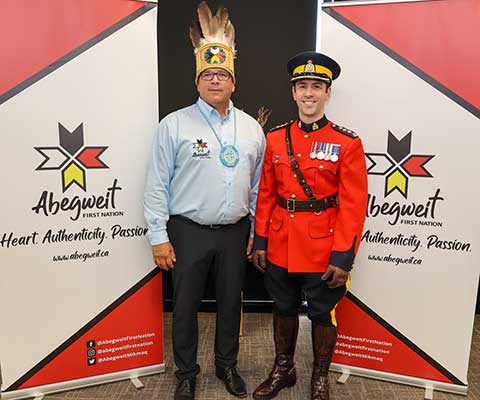
Abegweit First Nation's Chief Roddy "Junior" Gould in ceremonial dress stands beside PEI RCMP Commanding Officer Chief Superintendent Kevin Lewis.
During Mi'kmaq history month, Constable Louanne McQuaid had the opportunity to listen to important reflections from Elder Doreen Jenkins from Abegweit First Nation in Scotchfort, P.E.I..
- What would you like people to know about the history of the Mi'kmaq community?
-
I think it's really important to realize that when we were given this land by the creator, our people always took care of whatever resources we had. We made sure that whatever we fished or hunted, we moved from spot to spot on the island so we wouldn't overdo it. We were always mindful and resourceful for what we had around us. We made sure that we didn't take more than we needed. And we made sure that we never took anyone's spot. That analogy goes a long way with how we interpret what's given to us today. In our traditions, it's always important to know that we are, and have always been very proud people - until we came in contact with alcohol and drugs. With alcohol and drugs, you get it all you want until it gets you. And once it gets you, you have no power over it. In all those struggles that we had because we were living on reserves, with it goes your pride, your dignity, and your self-worth. It changed the whole quality of life we had.
- What advice do you have?
-
As an elder now, I look back and think of all of the different facets of my life that I went through, and all of the struggles the children have today. I think that our leadership in our reserves is the one big key to helping the people gain back some of their power and strength and belief in who they are. The two chiefs that hold really near and dear to my heart are Brian Francis and Chief Junior Gould. They brought the reserves along at a phenomenal rate. Now they have so many good activities for children, and they let them know that they matter and have a say. The children can stand up for themselves and say "You can't do this to me, you can't treat me like that." Teaching self-preservation, and dignity, and respect is so important. Respect for your culture and for yourself gives you the strength to be the person you're supposed to be. Your words matter. It changes for you for your self-worth. By making the children strong and educated, they in turn pass it on. The bad stories, it's important for people to hear these too, because those actions should never be repeated in society.
- You mentioned earlier when I was speaking to you, that your first love is yourself?
-
Absolutely. To know self-love is to know that you will never allow yourself to be put down. You will have the courage to walk away from people that are going to harm you. You will have the courage to say "you can't do that to me, I won't accept it." It's important for our children to stay strong, to stay away from drugs and alcohol, and to stay healthy in mind, body and spirit.
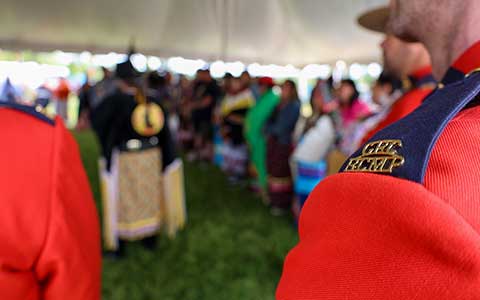
The shoulder flash of an RCMP member in red serge is shown in front of a blurred background of a dancer at the Abegweit First Nations Pow Wow.
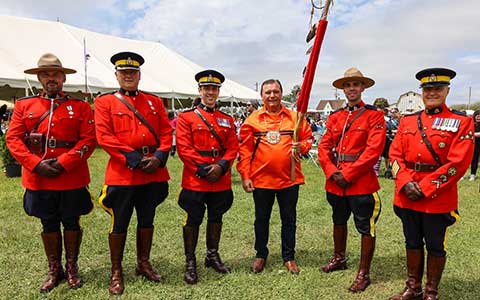
PEI RCMP members in red serge stand with Mi'kmaq member and Canadian Senator Brian Francis at the Abegweit Pow Wow.
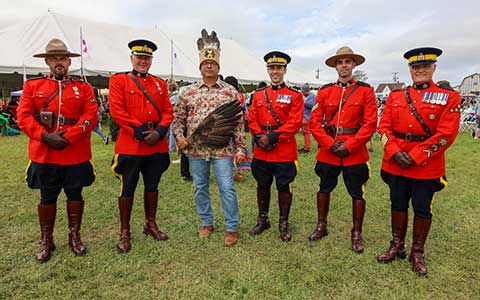
PEI RCMP members in red serge stand with Abegweit First Nations Chief Roddy "Junior" Gould at the Abegweit Pow Wow.
- Date modified: